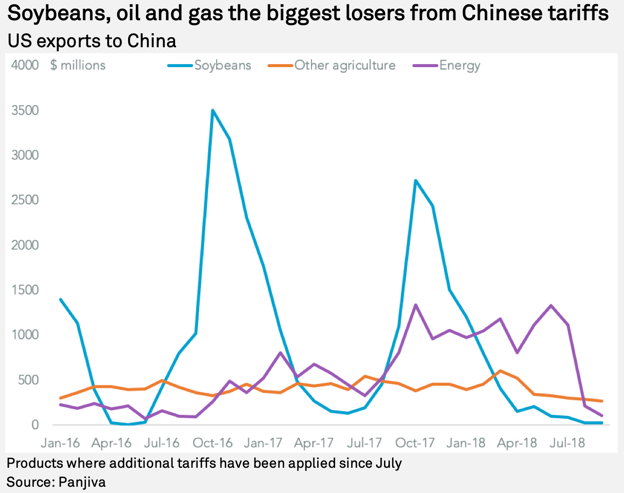US-China Trade War: Analyzing Beijing's Attempts At Damage Control

Table of Contents
Domestic Stimulus Measures
Facing the economic headwinds created by the US-China trade war, Beijing implemented various domestic stimulus packages designed to offset the negative impacts. These measures focused on boosting domestic demand and supporting industries heavily affected by retaliatory tariffs and trade restrictions. The goal was to maintain economic growth and stability amidst the external pressures.
-
Increased infrastructure investment: Massive investments were channeled into infrastructure projects, including transportation networks (high-speed rail, roads, ports), technological upgrades, and renewable energy initiatives. This strategy aimed to create jobs, stimulate economic activity, and modernize the Chinese infrastructure.
-
Tax cuts and subsidies: Beijing implemented significant tax cuts for businesses and provided substantial subsidies to both businesses and consumers. These measures aimed to incentivize spending and investment, counteracting the negative effects of reduced exports.
-
Monetary policy adjustments: Lowering interest rates encouraged borrowing and investment, making it cheaper for businesses to expand and for consumers to make purchases. This monetary easing was a key component of the overall stimulus package.
-
Promoting domestic consumption: Targeted campaigns were launched to promote domestic consumption, encouraging citizens to buy Chinese goods and services. This strategy aimed to reduce reliance on exports and bolster the domestic market.
-
Support for SMEs: Small and medium-sized enterprises (SMEs), often the backbone of the Chinese economy, received targeted support to help them navigate the challenging economic climate. This included access to credit, tax breaks, and other forms of financial assistance.
Diversification of Trade Partners
The trade war highlighted China's dependence on the US market. In response, Beijing aggressively pursued a strategy of trade diversification, seeking to reduce reliance on any single trading partner. This involved strengthening ties with existing partners and forging new relationships globally.
-
Belt and Road Initiative (BRI): The BRI, a massive infrastructure development initiative, played a crucial role in strengthening trade relations with numerous countries across Asia, Africa, and Europe. This initiative provided new markets for Chinese goods and services while also improving connectivity and infrastructure in participating nations.
-
Expanding trade relationships: China actively engaged in enhancing trade relationships with countries in Asia, Africa, and Latin America. This involved signing free trade agreements, promoting investment, and fostering economic cooperation.
-
Attracting foreign investment: Beijing implemented policies to attract foreign investment in key sectors, aiming to diversify its economic base and reduce dependence on domestic demand alone.
-
Import substitution: Policies aimed at promoting import substitution were implemented to reduce reliance on imported goods, fostering domestic production and reducing vulnerability to external shocks.
Technological Self-Reliance
The US-China trade war exposed vulnerabilities in China's reliance on foreign technology, particularly in strategically important sectors. Beijing responded with a renewed focus on achieving technological independence.
-
Increased R&D investment: Substantial investment was poured into research and development (R&D) across various sectors, particularly in areas like semiconductors, artificial intelligence, and 5G technology.
-
Supporting domestic tech companies: Chinese technology companies received significant support to accelerate their growth and competitiveness, reducing reliance on foreign technologies.
-
Reducing dependence on imports: Initiatives were put in place to decrease dependence on foreign technology imports, strengthening domestic capabilities and supply chains.
-
Made in China 2025: This ambitious plan, aimed at transforming China into a global leader in advanced manufacturing, received renewed impetus as a direct response to the trade war's challenges.
Effectiveness of Beijing's Damage Control
Evaluating the effectiveness of Beijing’s damage control strategies requires a nuanced analysis. While some measures proved effective in mitigating the immediate impact of the trade war, the long-term consequences and the overall success remain a subject of ongoing debate.
-
GDP growth rates: Analyzing GDP growth rates during and after the trade war provides valuable insight into the overall economic impact and the success of stimulus measures.
-
Impact on specific industries: The effects of the trade war varied across different sectors. Assessing the impact on agriculture, manufacturing, and technology provides a clearer picture of the overall consequences.
-
Effectiveness of stimulus: Analyzing the effectiveness of fiscal and monetary stimulus measures is crucial for understanding their contribution to mitigating the economic fallout.
-
Long-term structural changes: The trade war may have spurred long-term structural changes in the Chinese economy, influencing its future trajectory and global economic standing.
Conclusion
The US-China trade war posed a significant challenge to the Chinese economy. Beijing’s response was multifaceted, encompassing domestic stimulus, trade diversification, and a forceful push for technological self-reliance. While certain measures mitigated the immediate impact, the long-term effects and the overall success of Beijing’s damage control strategies remain areas requiring further study. Understanding the intricacies of the US-China trade war and Beijing’s responses is critical for navigating the evolving landscape of global trade relations. Further research into the economic impact of the trade war and the effectiveness of various damage control strategies is essential for comprehending the future trajectory of the global economy.

Featured Posts
-
 Wrigley Field Incident Fan Hospitalized Following Fall
May 02, 2025
Wrigley Field Incident Fan Hospitalized Following Fall
May 02, 2025 -
 Lotto 6aus49 Gewinnzahlen Mittwoch Den 9 4 2025
May 02, 2025
Lotto 6aus49 Gewinnzahlen Mittwoch Den 9 4 2025
May 02, 2025 -
 Jinapor On Npps 2024 Election Loss A Difficult Reality
May 02, 2025
Jinapor On Npps 2024 Election Loss A Difficult Reality
May 02, 2025 -
 Reform Uk Mp Rupert Lowe Explains Suspension Following Farage Dispute
May 02, 2025
Reform Uk Mp Rupert Lowe Explains Suspension Following Farage Dispute
May 02, 2025 -
 Is Fortnite Offline Galactic Battle Launch And Server Issues
May 02, 2025
Is Fortnite Offline Galactic Battle Launch And Server Issues
May 02, 2025
Latest Posts
-
 Paeivitetty Lista Britannian Kruununperimysjaerjestys
May 10, 2025
Paeivitetty Lista Britannian Kruununperimysjaerjestys
May 10, 2025 -
 Wynne Evans Responds To Strictly Come Dancing Return Calls The Truth Will Win
May 10, 2025
Wynne Evans Responds To Strictly Come Dancing Return Calls The Truth Will Win
May 10, 2025 -
 Strictly Come Dancing Star Wynne Evans Breaks Silence On Future Plans
May 10, 2025
Strictly Come Dancing Star Wynne Evans Breaks Silence On Future Plans
May 10, 2025 -
 Suspect Sought In Elizabeth City Vehicle Break Ins
May 10, 2025
Suspect Sought In Elizabeth City Vehicle Break Ins
May 10, 2025 -
 Wynne Evans Unexpected Career Move After Strictly Come Dancing
May 10, 2025
Wynne Evans Unexpected Career Move After Strictly Come Dancing
May 10, 2025
